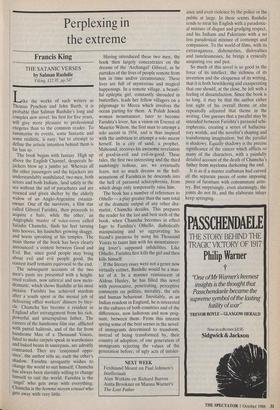Perplexing in the extreme
Francis King
THE SATANIC VERSES by Salman Rushdie
Viking, £12.95, pp.547
Like the works of such writers as Thomas Pynchon and John Barth, it is probable that Salman Rushdie's long and complex new novel, his first for five years, will give more pleasure to professional exegetes than to the common reader. To summarise its events, some fantastic and some realistic, is easy; but to attempt to define the artistic intention behind them is far less so.
The book begins with fantasy. High up above the English Channel, desperate hi- jackers blow up a jumbo jet. Whereas all the other passengers and the hijackers are understandably annihilated, two men, both actors and both Indians, land safely in the sea without the aid of parachutes and are rescued and given shelter by the elderly widow of an Anglo-Argentine estanza- owner. One of the survivors, a film star called Gibreel Farishta, then proceeds to acquire a halo, while the other, an Anglophile master of voice-overs called Saladin Chamcha, finds his feet turning into hooves, his haunches growing shaggy, and horns sprouting at his temples. The main theme of the book has been clearly announced: a contest between Good and Evil. But, since good people may bring about evil and evil people good, the contest itself remains equivocal to the end.
The subsequent accounts of the two men's pasts are presented with a height- ened realism, now satirical and now melo- dramatic, which shows Rushdie at his most incisive. Farishta has achieved stardom after a youth spent in the menial job of delivering office workers' dinners by bicy- cle. Chamcha has become a resident in England after estrangement from his rich, Powerful and unscrupulous father. The careers of the handsome film star, afflicted with putrid halitosis, and of the far from handsome Man of a Thousand Voices, fated to make carpets speak in warehouses and baked beans in saucepans, are adroitly contrasted. They are 'conjoined oppo- sites', the author tells us, each the other's shadow. Farishta arrogantly wishes to change the world to suit himself; Chamcha has always been slavishly willing to change himself to suit the world. Farishta is the `angel' who gets away with everything; Chamcha is the homme moyen sensuel who gets away with very little.
Having introduced these two men, the book then largely concentrates on the dreams of the 'Archangel' Gibreel, as he partakes of the lives of people remote from him in time and/or circumstance. These lives are full of mysterious and magical happenings. In a remote village, a beauti- ful epileptic girl, constantly shrouded in butterflies, leads her fellow villagers on a pilgrimage to Mecca which involves the ocean parting for them. A Polish Jewish woman mountaineer, later to become Farishta's lover, has a vision on Everest of Maurice Wilson, the first man to attempt a solo ascent in 1934, and is thus inspired with the ambition to attempt a solo ascent herself. In a city of sand, a prophet, Mahound, receives his awesome revelation of good-in-evil and evil-in-good. These tales, the first two interesting and the third numbingly tedious, are, we eventually learn, not so much dreams as the hall- ucinations of Farishta as he descends into the hell of paranoid schizophrenia, from which drugs only temporarily raise him.
The book has a number of references to Othello — a play greater than the sum total of the dramatic output of any other dra- matist, Chamcha decides. This prepares the reader for the last and best sixth of the book, when Chamcha becomes in effect Iago to Farishta's Othello, diabolically manipulating and so aggravating his friend's paranoia by using his Thousand Voices to taunt him with his mountaineer- ing lover's supposed infidelities. Like Othello, Farishta first kills the girl and then kills himself.
If the literary essay were not a genre now virtually extinct, Rushdie would be a mas- ter of it. In a manner reminiscent of Aldous Huxley, he has filled this novel with provocative, penetrating, perceptive comments on politics, morality, the arts and human behaviour. Inevitably, as an Indian resident in England, he is interested in the cultures of both countries and of the differences, now ludicrous and now poig- nant, between them. From this interest spring some of the best scenes in the novel: of immigrants determined to transform, instead of being transformed by, their country of adoption; of one generation of immigrants rejecting the values of the generation before; of ugly acts of intoler- ante and even violence by the police or the public at large. In these scenes Rushdie tends to treat his English with a paradoxic- al mixture of disgust and grudging respect, and his Indians and Pakistanis with a no less paradoxical mixture of contempt and compassion. To the world of films, with its extravagances, dishonesties, disloyalties and tastelessnesses, he brings a cynically unsparing eye and pen.
So much of this novel is so good in the force of its intellect, the richness of its invention and the eloquence of its writing, that it is both bewildering and exasperating that one should, at the close, be left with a feeling of dissatisfaction. Since the book is so long, it may be that the author either lost sight of his overall theme or else repeatedly adjusted that theme in the writing. One guesses that a parallel may be intended between Farishta's paranoid schi- zophrenia, creating a series of hallucina- tory worlds, and the novelist's shaping and transforming imagination, but the parallel is shadowy. Equally shadowy is the precise significance of the cancer which afflicts so many of the characters, with a painfully detailed account of the death of Chamcha's father from myeloma darkening the end.
It is as if a master craftsman had carved all the separate pieces of some imposing piece of furniture with consummate artis- try. But surprisingly, even alarmingly, the joints do not fit, and the elaborate inlays keep springing.


































































 Previous page
Previous page